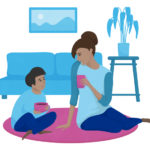How will the winter darkness affect kids’ learning and sleep this year?

The recent fall back of the clocks marked the official end of daylight saving time (DST). It also marks the beginning of the season of shorter days and darker evenings. For many of us, this makes it harder to spend time outside.
So, what effect will the increasing darkness have on kids and teens as we head into the winter months still dealing with the COVID-19 pandemic? For answers we turned to Dr. Judith Owens, director of the Center for Pediatric Sleep Disorders at Boston Children’s Hospital.
How do the darker winter months affect kids?
The shorter amount of daylight in 24 hours can definitely have an effect on everyone’s mood, and kids are no different. Many people have heard about seasonal affective disorder (SAD), which is a type of depression linked to changing seasons. But I think a lot of people may have a type of sub-clinical SAD and feel less energy during the winter months. Some of this is because people are outside less, and getting less exercise, and that can affect general health, as well as sleep.
What effect does the time change have on kids’ school schedules and learning?
The extra light in the morning usually makes it easier for kids to get up and get going, whether they are going to school in person or online. But having fewer hours of daylight in the afternoon affords them less opportunity to get outside before it’s dark. So if kids have any flexibility in their school schedule, I encourage them to get outside during the daylight hours and do their computer work later in the afternoon when it’s dark.
What effect is online schooling having on kids’ sleep?
I worry about the amount of screen time and sedentary time that kids are spending during the day. When kids are physically in school, they are still sitting for much of the day, but there’s much more movement and interaction with peers. And they are not sitting in front of a computer screen all day.
At this point, we don’t know how all this extra screen time will affect kids’ circadian rhythm, the body’s internal clock. We do know that when screens are used at bedtime, the blue light they emit suppresses melatonin, which makes it makes it harder to fall asleep. But we just don’t know much about how kids’ overall circadian rhythm will be affected now that they are on screens all day.
We’re currently involved in a survey study of middle school and high school students, looking at how the remote learning environment is affecting their sleep and health, so we hope to have better answers soon.
Should parents worry about their teens’ unusual sleep patterns during this time of remote learning?
The normal sleep schedule for teenager is in the range of 11 p.m. to 8 a.m. So as long as that doesn’t conflict with the time they need to sign on to school, it’s fine for them to be on that schedule. In fact, we’re finding some high school students are benefitting from remote learning, in terms of sleep, because they don’t have to commute to school so early.
But if your teen is staying up really late and not waking up until 11 or noon, that starts to cut into the day and the time they can be outside in the daylight. So, that’s probably not so healthy. And if they are up late playing video games or on phone or computer, they are being cognitively stimulated and being stimulated by blue light, so they don’t get tired and it perpetuates that late sleep cycle.
What can parents do to help their kids get a good night’s sleep?
There are a few tried and true measures that generally work well to reinforce your child’s circadian rhythm. These include:
- having a bedtime routine
- having a regular bedtime
- keeping the same sleep schedule on weekdays and weekends
- keeping a regular schedule as much as possible for meals
- a bedroom that is dark at night and light in morning
You should also be sensitive to how much sleep your child needs, because there’s a range of normal for different age groups. If your child wakes up spontaneously in the morning without several reminders, they are probably getting the amount of sleep that they need.
Parents should also be aware of their kids’ level of anxiety and fear. We are seeing more kids with these issues because of all the changes to their schedules, as well as general fears about the pandemic. This can definitely affect their sleep schedule. You can help reduce anxiety by limiting their access to upsetting news and also just checking in with your child often to ask how they are doing.
Read more about Boston Children’s response to COVID-19.
Related Posts :
-

Keeping kids active indoors: Top tips from our experts
For many parents, keeping their kids active during the spring and summer months of COVID-19 involved a lot of outdoor ...
-

Anxiety in kids during COVID-19: What parents should know
Some kids hide in their rooms. Others turn their cameras off during remote learning and don’t want to talk ...
-

Preparing your kids for the holidays during COVID-19
Like most things this year, the holiday season will be marked by the coronavirus pandemic. For you and your family, ...
-

Why do some children exposed to the coronavirus go on to develop MIS-C?
Most children exposed to the SARS-CoV-2 coronavirus have few or no symptoms. But a small number become sick enough to ...





